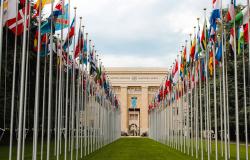
Politicians and scholars have often considered Europe and Latin America and the Caribbean as like-minded, natural partners, characterized not only by historical and cultural ties, but also by shared values and principles. This article aims to test the extent to which EU-LAC convergence is a reality by comparing the agreement between both regions in multilateral arenas. Specifically, we explore the similarity in roll-call votes and cosponsorship of draft resolutions at the UN General Assembly from 2000 to 2020. EU-LAC convergence on those metrics is placed into perspective by comparing similarities across all UN regional groups. Furthermore, our analysis zooms in on the content of the proposals to detect the issues that have caused greater divergence/convergence between EU-LAC. We find that the two regions continuously cooperate on the rights of the child, but are increasingly at odds with regard to topics such as human rights and armaments. The realist tone of these themes suggests that a normative Europe has met an emerging geopolitical Europe that is increasingly concerned with security-related issues. We trace this new agenda to the rising challenges in Europe's external relations, from protectionism to the Russia–Ukraine war, and see the diminishing EU-LAC convergence as its multilateral expression.
Policy implications
- Voting convergence between the EU and Latin America and the Caribbean (LAC) at the multilateral level is not given. Countries from both regions need to build on a regular diplomatic dialog to foster mutual understanding and cooperation on several global issues, especially on the most divisive ones such as human rights and (nuclear) disarmament.
- The UN General Assembly votes are polarized by almost 10% between countries of the Global South and Europe/North America. However, the EU's votes are closer to those of the LAC countries (73%) than to other groups of countries in the Global South. LAC countries can be a gateway for Europeans to build bridges with the Global South in key multilateral files. Such conversations must nonetheless be mindful of the context and policy specificities of both regions.
- The EU and LAC countries should invest in further cooperation at the UN level on issues where there are truly shared values and common interests, such as children's rights, as evidenced by the high degree of convergence of positions on UN resolutions on this issue.
- Sponsorship of UN resolutions is where the EU and LAC countries differ most. In order to strengthen the interregional partnership at the multilateral level, the leaders of both regions must increase cosponsorship initiatives at the UN level.
-
The LAC countries must recognize the European shift from a normative Europe to an emerging geopolitical Europe, which has exacerbated differences with LAC countries. At the same time, Europeans must recognize that LAC countries do not share the same perception as Brussels on the rise of geopolitical concerns.
Photo by Mathias Reding